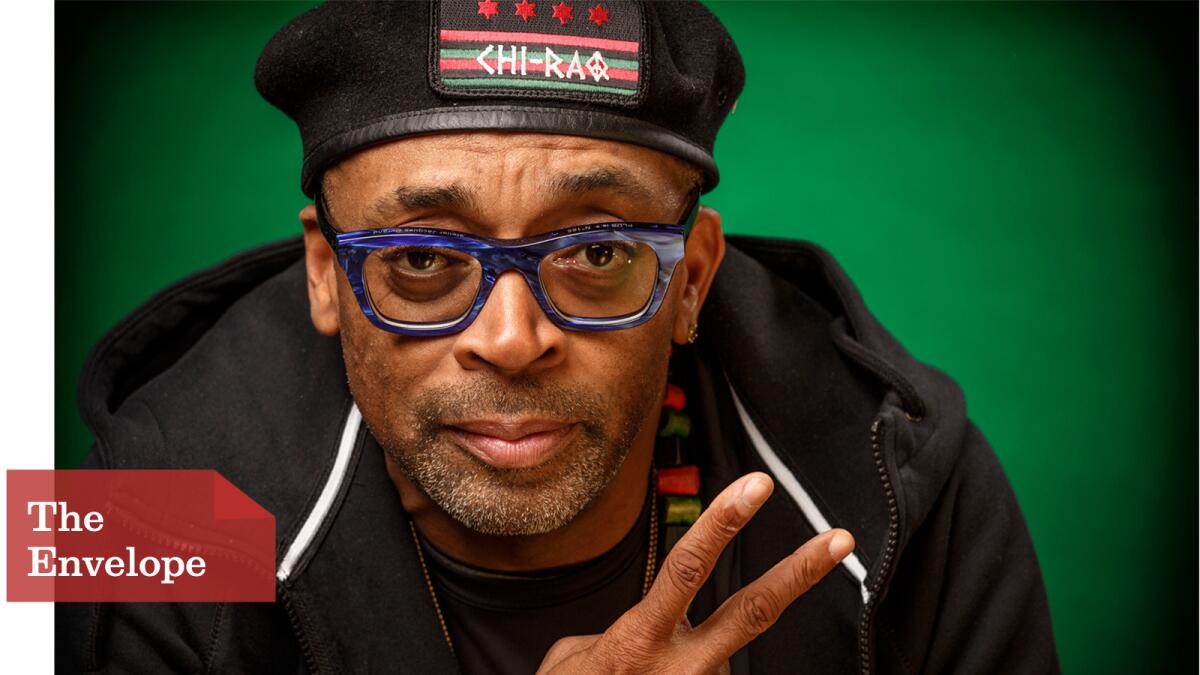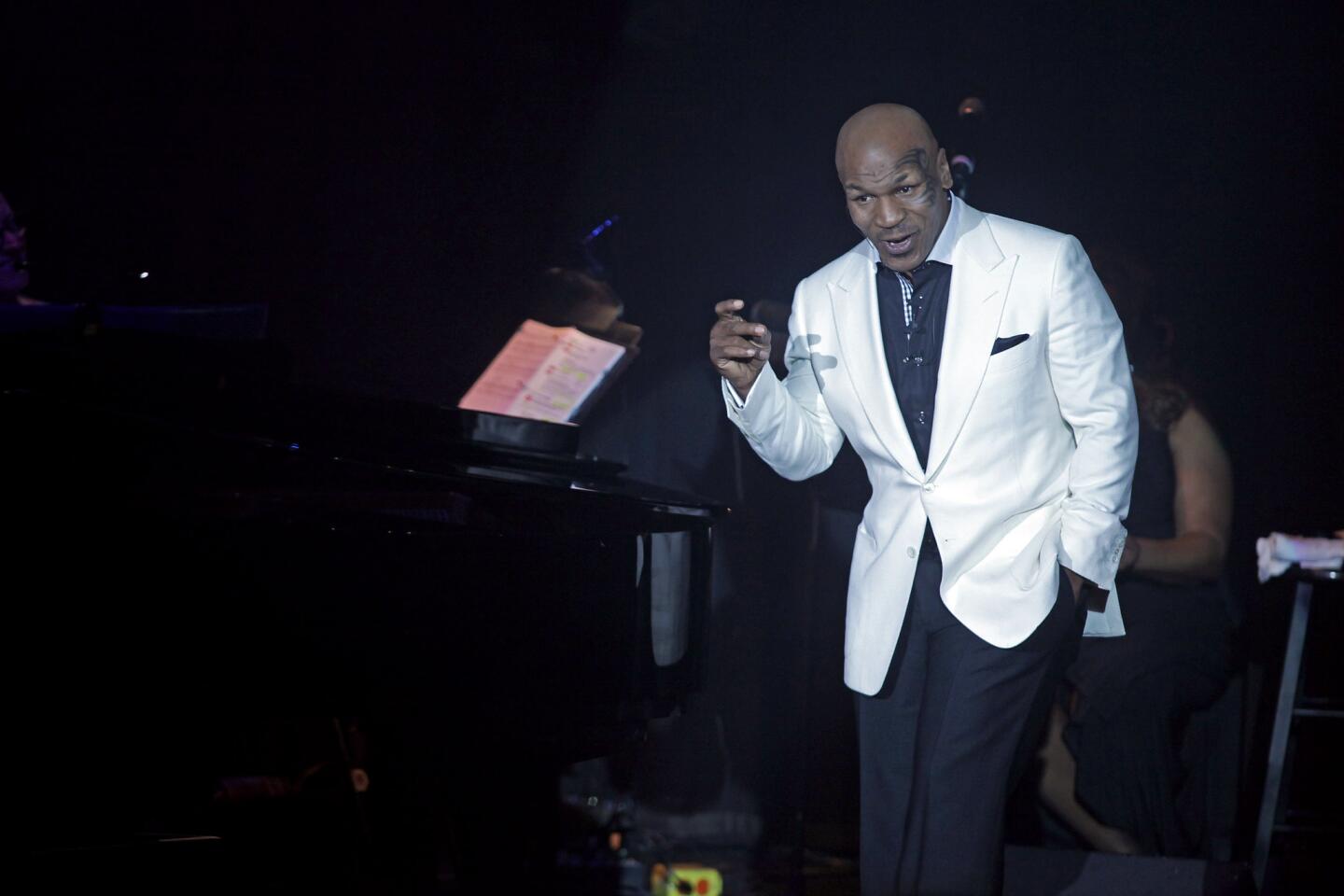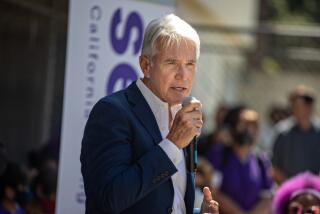With ‘Chi-Raq,’ Spike Lee takes on gun violence — and angers Rahm Emanuel

Spike Lee’s “Chi-Raq” addresses the gun violence in Chicago with a heightened reality that includes satire and musical numbers.
If there’s one thing director Spike Lee has come to expect with each new film, it’s blowback and controversy.
Notorious for exposing raw-nerve issues around race, class, sexism and everything else that makes America squirm, Lee has stepped back into the fray with “Chi-Raq,” a satirical take on the gun violence plaguing Chicago’s South Side.
“Nothing’s easy,” said Lee. “I suppose I could do some sort of Pixar-like film, but then I’m sure people would find some reason to be [ticked] off about that too.”
See more of Entertainment’s top stories on Facebook >>
Based on the 2,000-year-old Greek comedy “Lysistrata,” in which women withhold sex to stop their men from waging wars, “Chi-Raq” has garnered high praise from film critics and just the opposite from Chicago Mayor Rahm Emanuel, gun control advocates and defensive Chicagoans (the name of the film comes from a rap term combining Chicago with Iraq).
From the street, it’s easy to spot the Brooklyn headquarters of Lee’s film company, Forty Acres and a Mule Filmworks. It’s plastered with “Chi-Raq” art: A gun with an impotent, sagging muzzle under the words “Put Da Guns Down.” A red, white and blue map of the U.S. (made up of firearms rather than states) sitting under a banner the reads “America: The Armed and the Dangerous.”
Inside, Lee’s walls are lined with posters of his favorite films (Martin Scorsese’s “Mean Streets”) and his own productions such as “Jungle Fever” and “Malcolm X” — films that also challenged conventional narratives about the intersection of race, culture and politics.
“Critics said ‘Do the Right Thing’ would cause riots all across the country when it came out [in 1989], that black people would run amok,” said the poker-faced Lee, dressed in a black beret emblazoned with “Chi-Raq,” a military-style jacket and his trademark thick-rimmed round glasses. “With ‘Mo’ Better Blues’ I was called anti-Semitic. ‘She’s Gotta Have It,’ I’m exploiting black women. Take your pick. It ain’t nothing new.”
“Chi-Raq,” released Dec. 4 by Amazon films, was written by Lee and Kevin Willmott (“Bunker Hill”), and stars Nick Cannon as Demetrius Dupree, a gangbanging rapper with the stage name Chi-Raq. His girlfriend Lysistrata (Teyonah Parris) is enthralled with his gun-toting swagger just like everyone else in the neighborhood, until she runs into a mother (Jennifer Hudson) whose child was killed in the crossfire of rival gangs.
On the advice of an activist neighbor (Angela Bassett), Lysistrata starts a No Peace, No Piece movement that literally brings men with guns — gangs and police alike — to their knees. The film also stars Samuel L. Jackson as a dapper if not somewhat supernatural narrarator, Wesley Snipes as an eye-patch wearing gang leader and John Cusack as a peace-waging priest.
The characters speak mostly in verse, playfully rhyming dialogue about otherwise dark and heavy subject matter. It’s an odd juxtaposition that Lee says was intentional — a way to make people think. “We didn’t want to do a documentary,” said Lee. “I’d seen the Vice documentary [on Chicago], and I didn’t want to glamorize the violence. In real life, do people speak in verse? No, but satire gives us the license to do stuff that you can’t do in a straight drama. Singing and dancing. The film is a heightened reality.”
The film was largely shot in Chicago, and more specifically, in the crime-plagued neighborhood of Englewood. “The decision to take that premise of the play and move it to the South Side of Chicago, if we had set it in any other place it would have not been the same,” says Lee. “It needs to be at the place where blood is flowing on the streets. It’s not all of Chicago, but on the South Side and the West Side.”
While many in the area welcomed the attention on their otherwise underserved neighborhood, the film’s name alone caused friction between Lee and Emanuel. But right around the time “Chi-Raq” opened, the mayor came under scrutiny after a police dash cam from 2014 was released showing a white Chicago police officer shooting a black 17-year-old 16 times.
A federal civil rights investigation has since been launched into the Chicago Police Department’s practices, and several more cases of police shooting black citizens have prompted calls for Emanuel to resign.
“Uh huh, we know what we were doing,” said Lee regarding the serendipity of “Chi-Raq’s” release. “That’s one of the reasons Kevin and I wanted to do this film. Eighty-eight people die every day in the U.S. due to gun violence. I don’t care who pulls the trigger. What their complexion is. A cop or whoever. It don’t matter. A murder is a murder.”
But it wasn’t just the mayor who opposed Lee’s portrayal of Chicago, which has had nearly 500 homicides this year. Local artist Chance the Rapper said the film was “exploitative,” and other rappers voiced anger that Lee took a local term for their embattled parts of Chicago and gave it to his film.
“They say, ‘Spike’s not from Chicago,’” says Lee of his critics’ comments. “They say, ‘He’s not from the hood; Spike went to college’ — which is stupid. ‘He has a master’s degree’ — which is stupid. ‘Nick Cannon is soft, he’s not hood, he’s never been to jail, he ain’t got no bodies on him, he ain’t killed nobody.’ That type of criticism is really sad, and that’s the kind of … this film is trying to fight. I don’t care where I’m from, education, whatever they say. I’m not cosigning … and killing people is....”
“Chi-Raq” includes members of Purpose Out of Pain, a group of Chicago mothers who’ve lost children to violence. In a somber moment toward the film’s close, they hold up pictures of their late daughters and sons.
“When Kevin and I started this film, we thought it might help save lives,” said Lee. “I still believe that. These young brothers will see this film and it will change their mentality, make them think about what they’re doing. Onward and upward. Positivity. I will go to my grave believing art can do that.”
ALSO:
Spike Lee on Hollywood diversity: ‘We don’t have a vote. We’re not in the room.’
Teyonah Parris hopes to ‘inspire change’ with her role in Spike Lee’s ‘Chi-Raq’
Spike Lee on honorary Oscar: ‘This came out of nowhere, but that’s how blessings often come’
Follow The Times’ complete coverage of the Golden Globes and Oscars
More to Read
From the Oscars to the Emmys.
Get the Envelope newsletter for exclusive awards season coverage, behind-the-scenes stories from the Envelope podcast and columnist Glenn Whipp’s must-read analysis.
You may occasionally receive promotional content from the Los Angeles Times.














